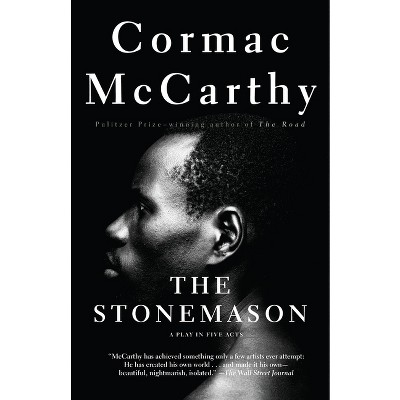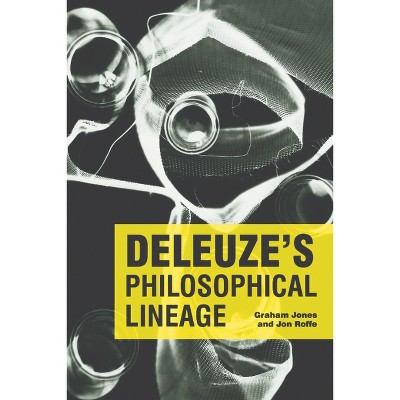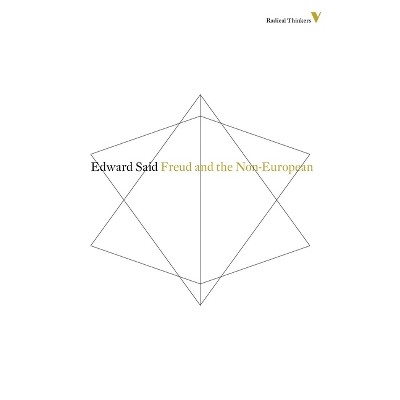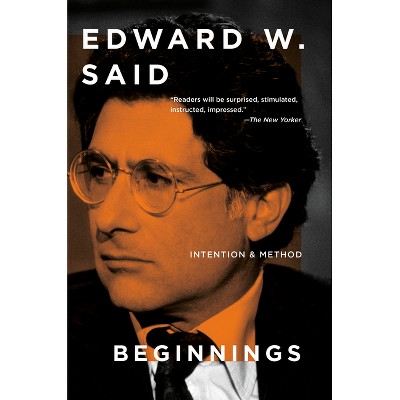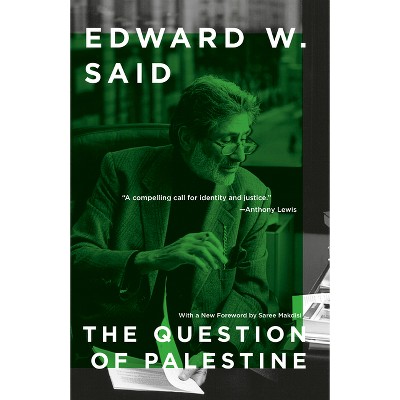Sponsored

Representations of the Intellectual - by Edward W Said (Paperback)
$12.99Save $6.01 (32% off)
In Stock
Eligible for registries and wish lists
Sponsored
About this item
Highlights
- In these impassioned and inspiring essays, based on his 1993 Reith Lectures, Edward Said explores what it means to be an intellectual.
- About the Author: Edward W. Said was born in 1935 in Jerusalem, raised in Jerusalem and Cairo, and educated in the United States, where he attended Princeton (B.A. 1957) and Harvard (M.A. 1960; Ph.D. 1964).
- 144 Pages
- Philosophy, History & Surveys
Description
Book Synopsis
In these impassioned and inspiring essays, based on his 1993 Reith Lectures, Edward Said explores what it means to be an intellectual. "Said is a brilliant and unique amalgam of scholar, aesthete and political activist. . . . He challenges and stimulates our thinking in every area." --Washington Post Book World Are intellectuals merely the servants of special interests or do they have a larger responsibility? In these wide-ranging essays, one of our most brilliant and fiercely independent public thinkers addresses this question with extraordinary eloquence. Said sees the the intellectual as an exile and amateur whose role it is "to speak the truth to power" even at the risk of ostracism or imprisonment. Drawing on the examples of Jonathan Swift and Theodor Adorno, Robert Oppenheimer and Henry Kissinger, Vietnam and the Gulf War, Said explores the implications of this idea and shows what happens when intellectuals succumb to the lures of money, power, or specialization.From the Back Cover
Celebrated humanist, teacher, and scholar, Edward W. Said here examines the ever-changing role of the intellectual today. In these six stunning essays - delivered on the BBC as the prestigious Reith Lectures - Said addresses the ways in which the intellectual can best serve society in the light of a heavily compromised media and of special interest groups who are protected at the cost of larger community concerns. Said suggests a recasting of the intellectual's vision to resist the lures of power, money, and specialization. in these powerful pieces, Said eloquently illustrates his arguments by drawing on such writers as Antonio Gramsci, Jean-Paul Sartre, Regis Debray, Julien Benda, and Adorno, and by discussing current events and celebrated figures in the world of science and politics: Robert Oppenheimer, Henry Kissinger, Dan Quayle, Vietnam, and the Gulf War. Said sees the modern intellectual as an editor, journalist, academic, or political adviser - in other words, a highly specialized professional - who has moved from a position of independence to an alliance with powerful institutional organizations. He concludes that it is the exile-immigrant, the expatriate, and the amateur who must uphold the traditional role of the intellectual as the voice of integrity and courage, able to speak out against those in power.Review Quotes
"Bracing and heartfelt. . . . A fiercely assertive description of the intellectual as an oppositional figure." --The New Yorker "Edward Said is the most distinguished cultural critic now writing in America." --Cornel West "Said is a brilliant and unique amalgam of scholar, aesthete and political activist. . . . He challenges and stimulated our thinking in every area." --Washington Post Book World
About the Author
Edward W. Said was born in 1935 in Jerusalem, raised in Jerusalem and Cairo, and educated in the United States, where he attended Princeton (B.A. 1957) and Harvard (M.A. 1960; Ph.D. 1964). In 1963, he began teaching at Columbia University, where he was University Professor of English and Comparative Literature. He died in 2003 in New York City. He is the author of twenty-two books which have been translated into 35 languages, including Orientalism (1978); The Question of Palestine (1979); Covering Islam (1980); The World, the Text, and the Critic (1983); Culture and Imperialism (1993); Peace and Its Discontents: Essays on Palestine and the Middle East Peace Process (1996); and Out of Place: A Memoir (1999). Besides his academic work, he wrote a twice-monthly column for Al-Hayat and Al-Ahram; was a regular contributor to newspapers in Europe, Asia, and the Middle East; and was the music critic for The Nation.Dimensions (Overall): 7.9 Inches (H) x 5.1 Inches (W) x .4 Inches (D)
Weight: .3 Pounds
Suggested Age: 22 Years and Up
Sub-Genre: History & Surveys
Genre: Philosophy
Number of Pages: 144
Publisher: Vintage
Theme: Modern
Format: Paperback
Author: Edward W Said
Language: English
Street Date: April 2, 1996
TCIN: 1003268705
UPC: 9780679761273
Item Number (DPCI): 247-04-8978
Origin: Made in the USA or Imported
If the item details aren’t accurate or complete, we want to know about it.
Shipping details
Estimated ship dimensions: 0.4 inches length x 5.1 inches width x 7.9 inches height
Estimated ship weight: 0.3 pounds
We regret that this item cannot be shipped to PO Boxes.
This item cannot be shipped to the following locations: American Samoa (see also separate entry under AS), Guam (see also separate entry under GU), Northern Mariana Islands, Puerto Rico (see also separate entry under PR), United States Minor Outlying Islands, Virgin Islands, U.S., APO/FPO
Return details
This item can be returned to any Target store or Target.com.
This item must be returned within 90 days of the date it was purchased in store, shipped, delivered by a Shipt shopper, or made ready for pickup.
See the return policy for complete information.
Frequently bought together

$18.88
MSRP $27.00
Buy 2, get 1 free select books, music & movies
4.8 out of 5 stars with 571 ratings
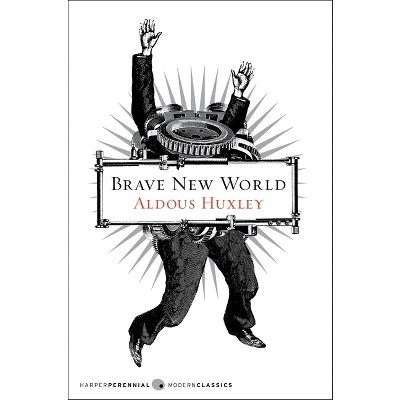
$10.34
MSRP $15.99
Buy 2, get 1 free select books, music & movies
4.3 out of 5 stars with 15 ratings

$15.68
Buy 2, get 1 free select books, music & movies
4.8 out of 5 stars with 190 ratings
Trending Philosophy

$13.99 - $23.05
MSRP $25.00 - $40.00
Buy 2, get 1 free select books, music & movies
4.4 out of 5 stars with 198 ratings

$15.00
MSRP $25.00
Buy 2, get 1 free select books, music & movies
4.5 out of 5 stars with 4 ratings

$10.23
was $10.78 New lower price
Buy 2, get 1 free select books, music & movies
4.6 out of 5 stars with 22 ratings

$8.18
MSRP $11.00
Buy 2, get 1 free select books, music & movies
4.8 out of 5 stars with 5 ratings

$12.69
MSRP $22.99
Buy 2, get 1 free select books, music & movies
5 out of 5 stars with 1 ratings

$7.26
MSRP $12.00
Buy 2, get 1 free select books, music & movies
4 out of 5 stars with 2 ratings
Discover more options

$14.90
MSRP $19.00
Buy 2, get 1 free select books, music & movies
5 out of 5 stars with 1 ratings

